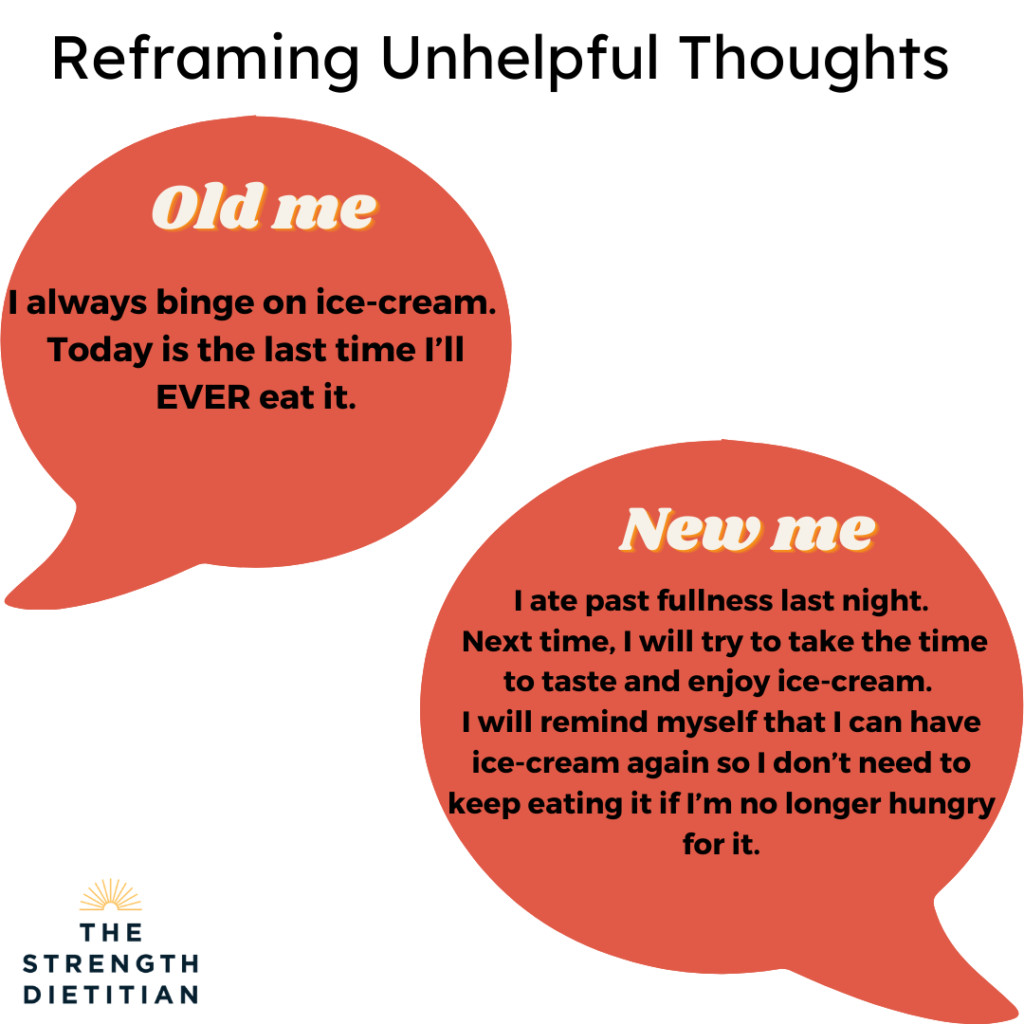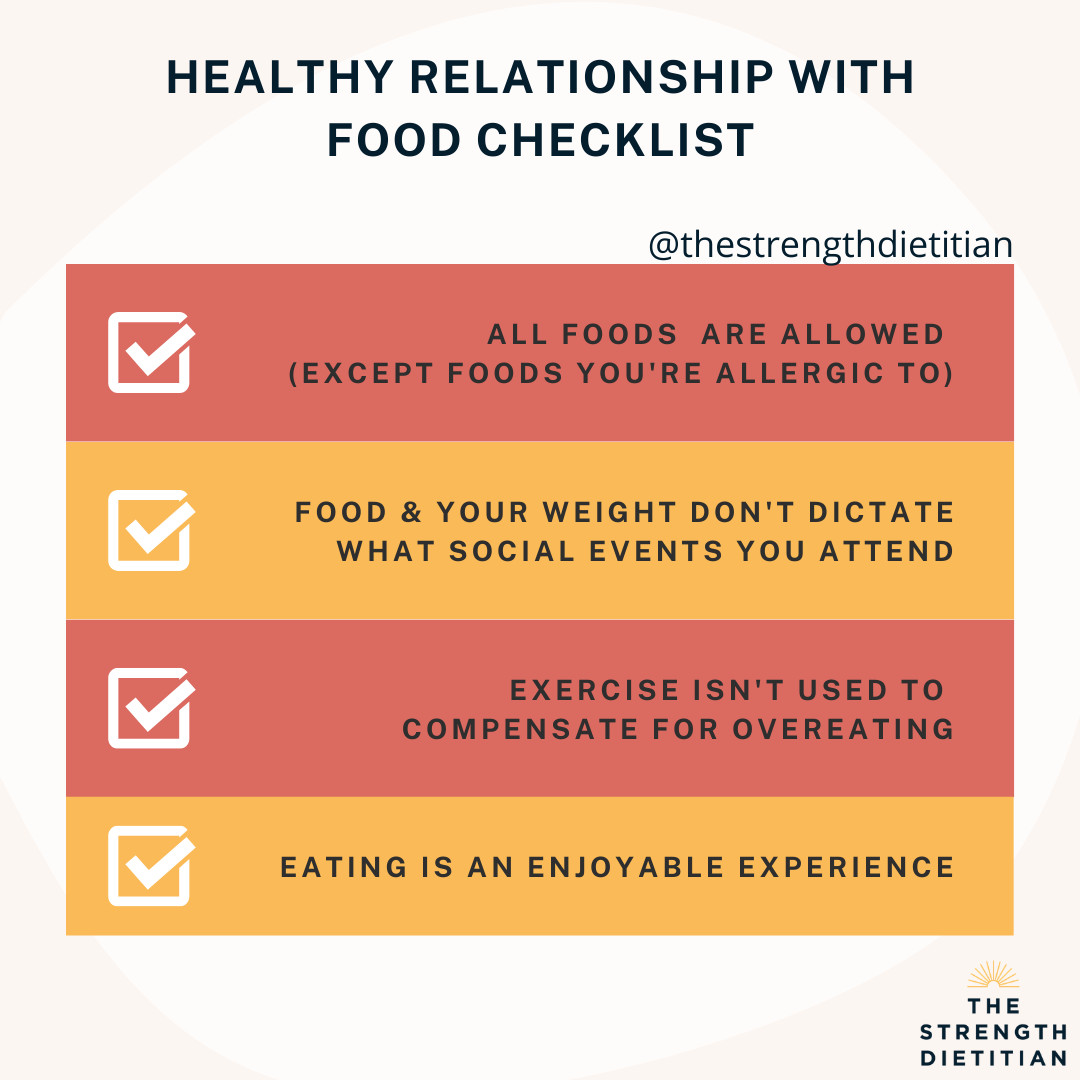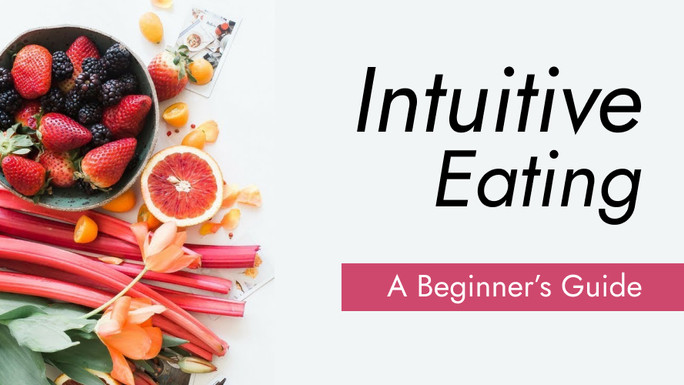What is Intuitive Eating?
Intuitive Eating is a holistic health approach that focuses on tuning into your body to meet its psychological and emotional needs.
It is completely weight neutral and takes an anti-diet approach to food. This means that health takes priority over how much you weigh. Many of us (health professionals included) have been taught to use our weight as an indicator of our health. The creators of Intuitive Eating openly criticise dieting based on research that dieting to lose weight is often sustainable and can lead to more weight gain. In addition, the authors note that diets often cause preoccupation and dissatisfaction with one’s body.
The two dietitians that created this approach consistently emphasize that it is not intended for weight loss and is not supposed to be used in conjunction with tracking macronutrients or calories. If you see a diet that focuses on “mindful eating to lose weight or be in a calorie deficit” than you can be sure that it is not an accurate reflection of the intuitive eating framework.
Unlike many popular diets that focuses on only fulfilling or supressing physical hunger (so that you can be in a calorie deficit), Intuitive Eating centres on physical and emotional satisfaction. The authors highlight that you may lose weight, gain weight or your current weight may stay stable. What matters is that you become more skilled at nourishing your body the way it needs and you extend self-compassion to all parts of yourself.
The 10 Principles of Intuitive Eating
1. Reject the diet mentality
While many individuals are praised on dieting and their “discipline” in sticking to a diet, the authors emphasize that dieting is a barrier to intuitive eating. This is because dieting relies on a set of rules and often doesn’t take into account your body’s cues on what you truly needs in that moment.
2. Honour your hunger
“I should stop eating now, I’ve had so much!”
“I should finish my plate, it’s a shame to let it go to waste. “
“My friend has stopped eating, so I should too.”
How many times have you had one of these thoughts before? Instead of letting social pressure or our own beliefs about what we “should” be doing dictate our eating behaviour, Intuitive Eating urges us to listen to our biological hunger cues that are both physical and mental.
This principle reminds us that there should be no judgment for feeling hungry, even if you just ate an hour ago. Could you imagine treating other biological cues with the same shame that we put on hunger? It’d be silly to get angry at our bodies for needing to pee and getting even more frustrated that we need to pee even more if we try to skip it or delay it.
Principle number 2 reminds us that we need to accept hunger as a normal and important biological cue that we should listen to.
3. Make peace with food.
This principle is a reminder to take the labels off food. There are no good or bad foods which means no food guilt. Making peace with food is especially important for individuals that have a history of restricting and/or bingeing and can help break the cycle.
When you give yourself unconditional permission to TRULY enjoy food, food no longer is a reward, treat or punishment. After decades of dieting, this can be extremely difficult to do alone so if you’d like extra support from a clinical dietitian with a background in psychology, you can reach out to me here.
An important step is reframing negative thoughts.

4. Challenge the food police.
The food police are the self-critical voices in your head that tells you that you are being “good” or “bad” when eating certain types and amounts of food. It reminds you that there are food rules that must be followed.
This voice is often a reflection of societal norms reinforced by media, family, friends, and even health professionals. Instead of just trying to block out this voice, the authors of intuitive eating encourage us to:
- explore the food police’s demands
- identify what are the judgmental thoughts that come up?
- dive into where and who did you first hear this from?
- how does it affect the way you nourish your body?
This allows us to engage in compassionate thinking and observe these judgmental thoughts with curiosity and a neutral awareness (we notice the thoughts but do not judge ourselves for having them).
This gives us the ability to eat according to our intuition and not be swayed by critical self-beliefs or expectations of others.

5. Feel your fullness
Do you ever eat past fullness because you were so distracted? Maybe you were at the cinemas and somehow by the end, you had finished the entire popcorn tub? Or perhaps, you were having dinner with acquaintances and felt awkward, so you just kept eating to avoid talking. By the end of the night, you realise you are uncomfortably full. In particular, when we are feeling fatigued, bored, uncomfortable or upset we tend to tune out and distract ourselves by scrolling through social media or turning on Netflix.
The authors help us recognise that there are occasions in which we may be more likely to eat while distracted and eat beyond what we truly needed or desired. It is emphasized within this principle that overeating is not “bad” or “a failure.” It happens to us all every now and again. With intentional practice and a lot of patience, however, we can gain more pleasure and feel less anxiety around food and mealtimes.
This principle helps remind us to check in throughout the meal and listen for our body signalling that we are full.
6. Discover the satisfaction factor.
I absolutely love this principle. Eating is a fundamental need that should also be pleasurable. When you are not focused on counting calories or avoiding certain foods, you can just focus on eating foods that make you feel good. This allows you to make positive choices based on what your body needs and what you feel like eating.
The authors encourage us to take the time to savour a meal and to give ourselves permission to stop eating when we feel satisfied. Tune into the textures, temperature, flavours, aromas and how it changes as you eat.
How many times have you walked away from a meal feeling full but unsatisfied?
It’s likely because you didn’t allow yourself to enjoy what you truly craved at that moment. You picked
7. Cope with your emotions with kindness and without using food
When difficult emotions arise, it may trigger emotional eating and a feeling of loss of control around food. While it is completely normal to eat emotionally or for comfort occasionally, we want to have other coping tools available to use when we are feeling sad, lonely, frustrated or bored.
Emotional eating can look like using food as stress relief, a distraction from difficult emotions, to feel numb or to comfort. Unfortunately, food is only a temporary fix and negative emotions will eventually still need to be addressed and felt.
In order to cope with our emotions with kindness, we must learn how to sit with our uncomfortable emotions. This gives us the time to listen to our emotions and decide what we truly need in that moment.
Some ways to self-nurture and soothe include getting some sunshine, taking deep breaths, a calming playlist, guided meditation or getting a cuddle from your pets.
8. Respect your body
Respecting your body requires self-acceptance and an understanding that your body is good and worthy.
This principle reminds you that each body is unique and healthy looks different on everybody. In the same way that we can’t expect a golden retriever to shrink the same size of a chihuahua or vice versa.

It is possible to admire bodies that are different to yours, while still accepting and appreciating your own. Intuitive eating invites you to imagine a life free of negative thoughts about your body and start creating that life.
9. Movement – feel the difference
Intuitive eating includes joyful movement because it’s important in nourishing your body and mind. This principle aims to shift the focus of losing weight to feeling joyful, energised and empowered.
Do you dread having to go for a run or do you absolutely love it? What about lifting weights, bike rides, yoga, dancing or soccer? You get to choose how, when and for how long you want to move your body.
I personally love short walks, powerlifting and swimming. I’d rather not do a 2 hour hike but a 2 hour gym session brings me so much joy and excitement. The authors also remind us to prioritise rest and recovery, to ensure that movement is something that is sustainable and doesn’t lead to burnout.

10. Honour your health with gentle nutrition
Part of intuitive eating is having a good understanding of nutrition and making food choices that you enjoy and nourish your body.
A massive misconception is that intuitive eating is just about the taste of foods and cravings. It’s also about eating foods that make us feel well-nourished and energised.
A helpful activity is to consider which meals help give you stable energy and concentration levels, and keep you feeling strong, satisfied, and nourished.
Pros:
- Nurtures a healthy relationship with food and body
- Gives back your time and mental energy (that has previously been focused on body checking, stressing about your weight, counting and worrying about food intake.
- Freedom from marketing BS and no more money wasted on diet products (that can often be double the price).
Cons:
- It takes time to learn how to intuitively eat.
- Still requires some nutritional understanding and guidance.
- You will likely experience a lot of backlash – internally as you try to let go and often externally from other individuals who struggle to understand intuitive eating.

How to get started
- Choose one meal a week to sit down to eat without distractions. For this weekly meal, put away your laptop, phone and turn off the television. You may choose to have this meal with others or alone. Just make sure it is a positive and calming environment. Take the time to look at all the colours on your plate, feel the texture and temperature of food in your mouth on the first bite.
When you’re halfway through the meal, tune into the taste again and ask yourself two questions:Does it taste as good as the first bite and is it still satisfying?
Do I want to continue eating this? - Have a backup meal for busy, tiring days that you can easily throw together in under 10 minutes.
I consider preparing meals ahead of time or having pre-prepared meals delivered as a form of self-care. Personally, I bulk batch a big pot of soup every Sunday night so that on the days I don’t have to worry about cooking on the days I come home late, hungry or frazzled. You may choose to prepare a week’s worth of meals ahead of time, prepare a curry in the slow cooker the night before, or remember to order your YouFoodz meals ahead of time. - Check in with yourself halfway through your meals and listen in for hunger and fullness cues. Are you still very hungry? Are you a few bites away from being comfortably full? Are you already full?
When asking yourself these questions, try your best to take away judgments and expectation on whether or not you should be full yet. There will be some days when you might leave food behind. On other days, you may choose to have a second serving. You can also use your mood, energy levels and ability to concentrate to guide you on if you are nourishing yourself adequately. - If you find yourself engaging in negative self-talk or avoiding a certain food, explore why you feel that way.
Are you labelling a certain food? Is there evidence supporting this label of “unhealthy/healthy” or “good/bad”? Don’t hesitate to ask for support with this. You can ask a partner or friend to be your accountability partner when it comes to negative self-talk or food rules that are interfering with your ability to intuitively eat. It can be extremely helpful to verbalise your fears aloud and explain why you feel that way to someone you trust.An example of noticing food rules and observing without judgment may look like: “Today I noticed that I was hesitant to eat X food, because I though it was too high in fat. That made it difficult for me to enjoy dinner because I felt guilty about eating X. I know that X food can be a part of a healthy diet and that my body need a variety of foods to function at it’s best. Having some high-fat foods means that my body is getting essential fatty acids, helps me absorb fat-soluble vitamins and can help me feel more satisfied when I eat.”
If you need further support from a registered dietitian, you can reach out to me here. - Unfollow and unsubscribe from anyone or anything that makes you feel uncomfortable or self-conscious about your body. If you notice yourself playing the comparison game or feel yourself getting drawn back into self-loathing, you can always mute or block. Not everyone will understand or care about intuitive eating and that’s okay. It’s your job to put your physical, emotional and mental health first.
Verdict:
I have to be honest, I initially had trouble wrapping my head around intuitive eating when I first heard about it. No rules around food? I need the occasional push to put away the chocolates and reach for the vegetables. If I listened to my body, my inner sweet tooth would absolutely destroy my health.
The more I learnt about intuitive eating, the more I liked it. I learnt that incorporating a strong understanding of nutrition with self-compassion can go a MASSIVE way in creating a joyful mindset and healthy, stress-free relationship with one’s body and food.
Intuitive eating takes time. After all, we have spent so long equating thinness to healthy and ignoring our hunger and fullness cues. It will take time to relearn and reconnect, but I promise it’s worth it.
Intuitive Eating FAQs
What exactly is intuitive eating?
Intuitive eating is so much more than just eating whatever you want. It involves tuning into and trusting your body and its cues on when, what and how much to eat. It requires you to let go of judgment, filter out the external pressure to diet, and use your intuition to adequately nourish your body.
It allows you to finally be at peace with food and your body.
Can you lose weight with intuitive eating?
It is possible that you lose weight with intuitive eating, but it is also entirely possible that you gain weight or stay exactly the same weight.Many individuals who struggle with binge eating end up losing weight with intuitive eating when bingeing ceases , but this is not always the case.
Intuitive eating was not designed for weight loss (although many companies do try to use it as part of diets). It was intended to be completely weight-neutral and founded on the principle that your body will settle at a healthy weight for you when you intuitively eat.
What does intuitive eating look like?
Intuitive eating looks like never having to diet again because you are no longer pursuing weight loss. It looks like making decisions based on your hunger and fundamental healthy eating principles, rather than what others think you should be eating.
It also involves being self-compassionate and choosing movement that you find joyful.




